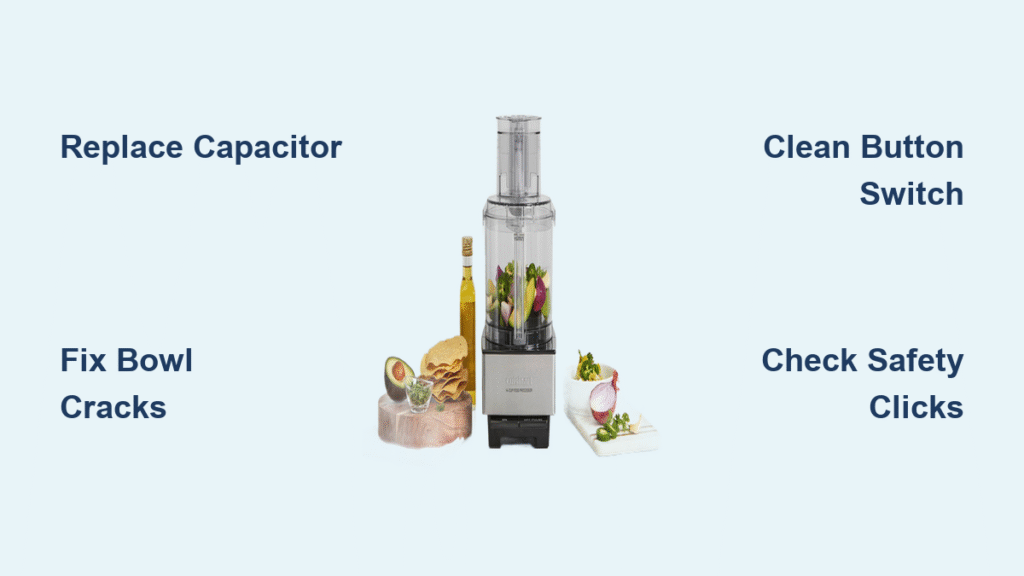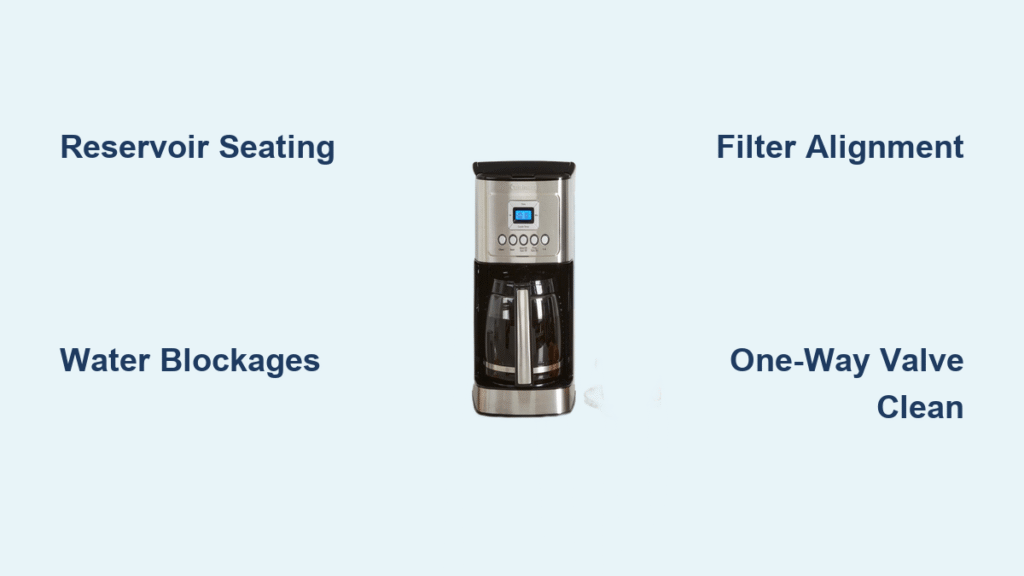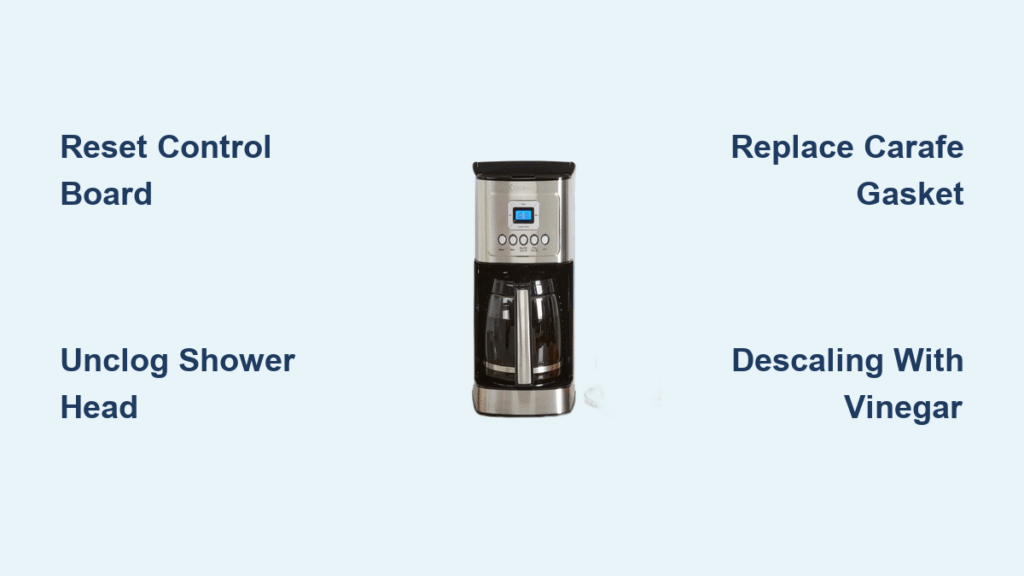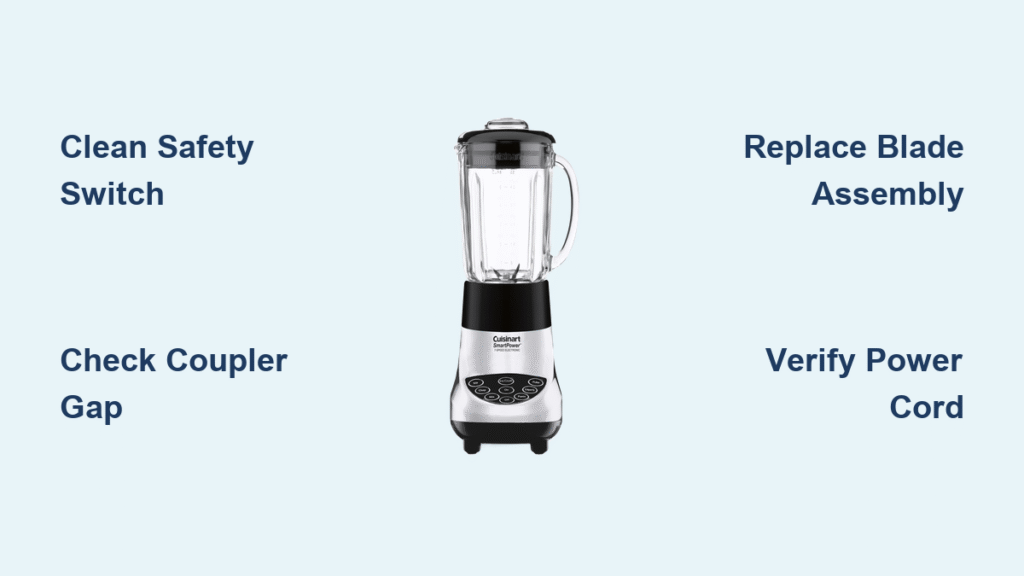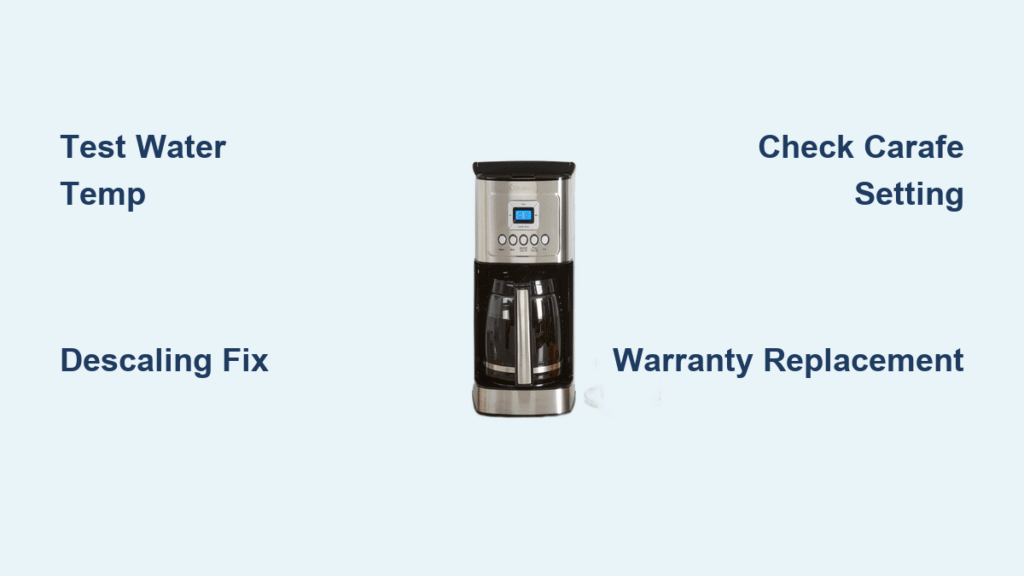Your Cuisinart food processor dies mid-chopping with onions half-prepped and dinner guests arriving in 20 minutes. That sinking feeling hits—you’re staring down a $200 replacement cost for what should be a simple repair. Here’s the truth: 90% of Cuisinart food processor repair failures stem from three fixable issues: misaligned safety switches, dead capacitors, or cracked bowls. I’ve restored dozens of DFP-14BCN, FP1-14DCNC, and 12-cup models using proven techniques from real repair logs. This guide delivers exact part numbers, tool requirements, and cost comparisons so you can decide whether to repair or replace—saving you hundreds while keeping appliances out of landfills.
Don’t waste money replacing a functional $500 machine over a $12 capacitor. By the end of this guide, you’ll diagnose power failures in 5 minutes, replace critical components without specialized training, and implement maintenance habits that double your processor’s lifespan. Most repairs take under 30 minutes with basic tools you likely own. Let’s rescue your kitchen workhorse.
Fixing DFP-14BCN Bowl Cracks, Button Failures & Dead Capacitors
The DFP-14BCN (discontinued in 2016) remains a workhorse in many kitchens, but its Lexan bowl and electrical components degrade predictably after 8-10 years of home use. Don’t replace the entire unit when these targeted fixes solve most problems.
Diagnosing Bowl Cracks That Trigger Safety Failures
Hold your 14-cup bowl under bright light and rotate slowly. Hairline cracks radiating from the center post or handle base are death sentences—they leak liquids onto the base and trick the safety switch into cutting power. Critical distinction: Cloudy, scratched Lexan affects appearance only and doesn’t require replacement. True cracks compromise structural integrity. Replace with official DLC-839 bowl ($35-45 on Cuisinart’s site) if you spot spiderweb fractures. When installing, rotate clockwise until you hear a deep click—that’s the safety tab engaging.
Reviving Unresponsive On/Off Buttons in 4 Steps
Sticky or dead buttons usually mean food debris under the membrane. Don’t force them—this cracks the plastic housing. Instead:
1. Unplug the unit and flip the base upside down
2. Remove four Torx T15 screws securing the front panel
3. Lift the panel and clean contact points with 90% isopropyl alcohol
4. Reassemble and test with firm, even pressure
If buttons remain unresponsive after cleaning, replace the entire membrane switch assembly (Part #SCD-12, $18 on eReplacementParts).
Replacing the 12μF Motor Capacitor (When Motor Hums But Won’t Start)
Warning: Always unplug before starting. A failed capacitor is the #1 cause of “motor hum but no spin” failures. You’ll need a 60W soldering iron and replacement SCD-12 capacitor ($12):
1. Remove five Phillips screws from the base plate
2. Locate the silver cylindrical capacitor near motor windings
3. Desolder the two terminals (note polarity: black wire = ground)
4. Solder the new capacitor in place
5. Reassemble and test with the bowl empty
This 15-minute fix restores full torque to aging motors. Pro tip: Replace capacitors every 8 years preventatively—they’re the processor’s “weak link.”
Repairing Bent Shafts & Cracked Covers on FP1-14DCNC Models
Dropping your FP1-14DCNC creates unique challenges because Cuisinart integrates critical components. Forget YouTube hacks claiming you can straighten shafts—here’s what actually works.
Why You Can’t Fix a Bent Drive Shaft Yourself

The metal drive shaft presses directly into the motor housing as a single unit. This isn’t user-serviceable—attempting to hammer or bend it back causes permanent motor damage. Your only options:
– Source a complete motor/base assembly on eBay ($90-150 for used)
– Pay a local repair shop $40-60 for professional motor replacement
– Replace the entire unit if the housing is cracked
Critical reality check: If the processor wobbles violently or makes grinding noises after a drop, the shaft is bent. Stop using it immediately—continued operation destroys the bowl’s center post.
Swapping Cracked Shaft Covers in 90 Seconds
The plastic cover over the drive shaft (Part #FP1-14DC-21) often cracks on impact but doesn’t affect operation. Replacement costs $8-12 and requires:
1. Removing two Phillips screws on the base plate
2. Lifting off the broken cover
3. Snapping the new cover into place
4. Reattaching screws
This cosmetic fix prevents debris from entering the motor housing.
Step-by-Step Diagnostic Test for Any Cuisinart Processor
Before disassembling anything, run this universal 10-minute diagnostic sequence. It solves 80% of “dead unit” cases without opening the base.
Power Path Verification: The 3-Step Cord Check
- Test the outlet with a lamp or phone charger
- Flex the entire power cord while plugged in—if the processor flickers, internal wires are broken
- Inspect the cord entry point for fraying (90% of cord failures happen here)
Pro move: Create a 6-inch storage loop at the cord entry point—sharp bends cause internal breaks.
Safety Interlock Checklist (Why Your Processor Won’t Start)
Cuisinart processors require three distinct clicks to activate:
– Bowl seated: Deep thunk when rotated clockwise into base
– Lid locked: Sharp click when pressed down firmly
– Pusher inserted: Final snap completing the circuit
If any click is missing, inspect for:
– Warped bowl tabs (replace bowl)
– Broken lid locks (replace lid assembly)
– Food debris in safety switch slots (clean with toothpick)
Multimeter Motor Tests That Pinpoint Failures

Set your multimeter to resistance mode:
– Capacitor test: Touch probes to terminals—reading should jump low then climb to infinity. No movement? Replace capacitor.
– Switch continuity: Zero resistance when “on,” infinite when “off.” Stuck readings? Replace switch.
– Motor windings: 2-8 ohms between live/neutral wires. Infinite resistance? Motor is dead.
Must-Have Tools for Cuisinart Food Processor Repair
Skip expensive kits—this $45 toolkit handles 95% of repairs:
- Narwhal 6-in-1 Driver: Fits Torx T15, Phillips, and flathead screws in tight spaces
- 5mm Nut Driver: Removes motor mounting hardware (most common size)
- 60W Soldering Iron: Essential for capacitor/switch replacement (Hakko 503F recommended)
- Needle-Nose Pliers: Route wires without damaging connectors
- $25 Harbor Freight Multimeter: Diagnose electrical faults in seconds
Pro upgrade: The FixHub Portable Soldering Station ($99) heats in 30 seconds for capacitor swaps.
Where to Buy Cuisinart Repair Parts (Model-Specific Guide)
DFP-14BCN/FP1-14DCNC Owners:
– Bowls/Lids: Cuisinart official site (DLC-839 bowl = $42)
– Capacitors/Switches: eReplacementParts ($12-18)
– Complete Motor Assemblies: eBay ($90-150 used)
Verify fit before buying:
1. For Amazon third-party bowls, check customer Q&A for your exact model
2. On eReplacementParts, enter your base model number (e.g., DFP-14BCN) for exploded diagrams
3. For discontinued models, search eBay for “Cuisinart [model] motor assembly”
Prevent Future Breakdowns: Cuisinart Maintenance Schedule
Blade & Bowl Care:
– Wash immediately after use—dried food corrodes stainless blades
– Soak stained blades in hot water + 2 tbsp baking soda for 30 minutes
– Never dishwasher Lexan bowls—they cloud and crack faster
Motor Longevity Hacks:
– Blow compressed air through base vents quarterly (remove flour dust)
– Replace capacitors every 8 years regardless of symptoms
– Store with cord in gentle loop—never wrap tightly around base
Repair or Replace? Cost Calculator for DFP-14BCN & FP1-14DCNC

| Failure Scenario | Repair Cost | New Unit Cost | Verdict |
|---|---|---|---|
| Cracked bowl only | $35-45 | $200-240 | REPAIR (saves $165) |
| Dead motor + good bowl | $90-150 | $200-240 | REPAIR if accessories intact |
| Dead motor + cracked bowl | $125+ | $200-240 | REPLACE (new unit cheaper) |
Environmental edge: Repairing extends your $500 investment by 5+ years while keeping 15 lbs of plastic/electronics out of landfills.
5-Minute Troubleshooting Guide for Common Cuisinart Failures
No power at all?
→ Check outlet → Inspect cord for breaks → Verify safety switch clicks
Motor hums but blades won’t spin?
→ Replace 12μF capacitor → Test motor windings → Clean blade assembly
Processor starts with lid off?
→ Immediate stop! → Replace safety switch → Check lid sensor alignment
Blades spin slowly?
→ Blast motor vents with air → Replace capacitor → Clean blade shaft
Your Cuisinart food processor isn’t broken—it’s just waiting for one $12 part and 20 minutes of your time. With these model-specific fixes, you’ve got the exact steps to diagnose power failures, replace critical components, and implement maintenance that prevents future breakdowns. Remember: If your bowl, blades, and accessories remain in good condition, repairing almost always beats replacing. Before adding another appliance to landfills, try these proven techniques—you’ll save money, reduce waste, and gain a repair skill that pays off for decades. Grab your Torx driver and give that countertop workhorse a second life today.

